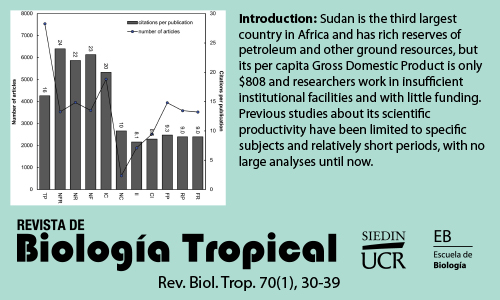Abstract
Introduction: Sudan is the third largest country in Africa and has rich reserves of petroleum and other ground resources, but its per capita Gross Domestic Product is only $808 and researchers work in insufficient institutional facilities and with little funding. Previous studies about its scientific productivity have been limited to specific subjects and relatively short periods, with no large analyses until now. Objective: To analyze the scientific output of Sudan in depth, considering all research areas and several decades of scientific activity. Methods: We retrieved the documents with “Sudan” in field country in the Science Citation Index Expanded for the period 1900-2019. Results: We retrieved over 9 000 publications and found that most were articles; that citation was higher for review articles and book chapters, and that this index mostly covered articles in English. Beginning in 1972, the number of publications in this database has increased rapidly. The citation lifespan indicates slow growth in the Sudanese scientific literature, and collaboration is frequent both nationally and internationally, possibly because the scarce resources make collaboration almost compulsory. Most external collaboration is done with Saudi Arabia but citation is higher for articles resulting from international megaprojects, led by Europe and the USA, in which Sudanese researchers play secondary roles. Research focusses on applied technological subjects with little innovation value. Women play a smaller role in Sudanese science. Conclusions: Our recommendations for Sudanese science include increasing the number of women in leading research positions; providing funding directly to researchers (i.e., bypassing bureaucratic bodies); increasing basic research to avoid stagnation; training Sudanese researchers for leading positions; and identifying specific research areas where Sudan can lead in its region.

This work is licensed under a Creative Commons Attribution 4.0 International License.
Copyright (c) 2022 Revista de Biología Tropical


